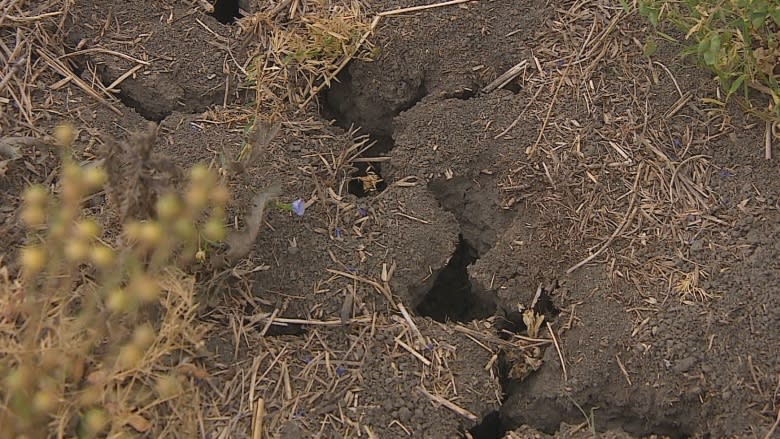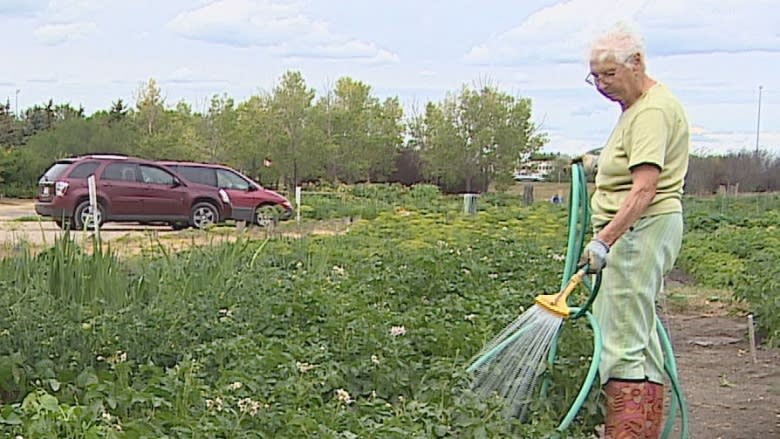'The damage is done': Home electricity boxes igniting in Sask. drought
While it's not surprising that scorching heat and bone-dry conditions are baking crops and thwarting mosquitoes, this summer's drought in southern Saskatchewan has also had some unexpected, and potentially dangerous, impacts.
Thousands of homes could be at risk from igniting electricity wires and meter boxes.
In its driest year since 1887, Regina only got 1.8 millimetres of rain the entire month of July, compared to its usual average 66 millimetres.
The city also had 11 days in July where temperatures soared above 30 C. The forecast for August calls for more heat, and little rain.
The hot, arid conditions are compacting and shifting the ground so much that the underground wires are yanked out of the boxes. The frayed copper wires continue to conduct electricity, and this can set off sparks and cause the wires or power meter boxes to ignite, leaving black smoke billowing in the air.
There have been seven such fires in Regina this summer.
Saskatchewan's energy utility, SaskPower, says thousands of homes are at risk. As of Thursday, it had inspected 3,200 homes and found that 1,200 needed repairs.
"All our resources are committed to inspections, and we have no end date," SaskPower spokesperson Jonathan Tremblay told reporters. "Rain may help here and there, but certainly the damage is done."
Thirsty, hungry livestock
The drought is also having an impact on the livelihoods of livestock producers, who are warning that a looming hay shortage could have a critical impact on the industry.
Bill Aulie only harvested 1,200 hay bales this summer, compared with the usual 3,000-5,000, and it won't be enough to feed his Clydesdale horses through the winter.
Aulie, who farms 5,000 acres near Rouleau, Sask., about 50 kilometres southwest of Regina, usually stores a year's worth of hay as reserves, but he'll still need to buy more hay from elsewhere.
Todd Lewis, president of the Agricultural Producers Association of Saskatchewan, told CBC News the problem was exacerbated by farmers coming up from the U.S. to buy hay earlier this year.
Hay and water shortages could force some ranchers to reduce the size of their cattle herds, according to industry experts.
"[S]ome of those smaller guys will just sell their herds off ... and they'll be out of the cattle business," Lewis said. "It's a pretty critical situation for the industry."
Some ranchers have already lost livestock.
In early July, ranchers near Shamrock, Sask., were shocked when 200 cattle died from dehydration and salt poisoning: extreme heat evaporated the animals' water source to such an extent that the salt concentration became deadly.
The province's chief veterinarian said it was like drinking ocean water.
Drought stresses crops
Aulie says he hasn't seen a drop of rain in 53 days, and that has meant his already smaller-than-normal lentil crop is ready for harvest two weeks early.
"It didn't fully mature, but it dried up and was forced it into a ripening stage," Aulie said.
He expects his canola and wheat harvest to be disappointing, as well. Aulie says his crops would have shriveled up entirely if not for last year's heavy rainfall and the clay soil in his area that retains moisture well. He also credits advanced farming practices that conserve water.
Saskatchewan Agriculture Minister Lyle Stewart says it isn't the worst crop year he's ever seen, but it's far from the best.
On Thursday, the provincial crop report stated that crops in southern Saskatchewan were rapidly drying and any future rainfall would likely come too late.
"Generally speaking, this crop is too far advanced to help now," Stewart told reporters.
Buzz kill
In the community garden near the University of Regina, Helen Kessler uses a hose to water her plants every other day. She's not happy about it.
"Watering from the ground is not the same as water that comes from the sky," Kessler said, adding that this is the most watering — and work — she's ever had to do in her 50 years of gardening.
The one consolation? She's not swatting mosquitoes.
"Oh, lordy, isn't that a blessing!" she said with a chuckle.
With no pools of stagnant water, there's no place for mosquitoes to breed. The city's mosquito traps, which are used to count the pesky pests, would normally catch about 400 mosquitoes a week. This week, just eight mosquitoes were captured.
"So we're phenomenally low; we just can't get any lower than what we are in terms of the summer," said Russel Eirich, pest control manager for the city. "The drought is actually working in our favour."
More of the same in August
Environment Canada's senior climatologist David Phillips predicts the hot, dry weather will continue in August.
"It's almost like nature has forgotten how to rain in southern Saskatchewan," Phillips said.
Any rain would come too late to help the farmers anyway.





